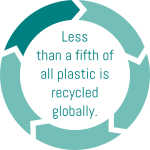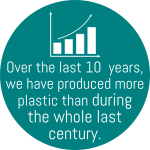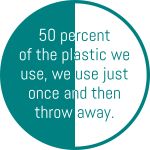Our Mission
We aim to provide information on sustainable alternatives to single use plastics. We will make products available at an affordable price and realistic quantities. With a simple to use, mobile-first ordering system and hassle-free delivery for individuals and businesses. Helping us all reduce our impact on the environment one small step at a time.
Why Are We Doing This?
Since plastic was first manufactured commercially in the mid 20th century, It is estimated that 8.3 billion tons has been produced. Of this, 6.3 billion tons has become waste that either goes to landfill or ends up as plastic pollution in the environment. If we continue on the current path, by 2050 there will be 12 billion tons of plastic waste.
This plastic can take more than 400 years to degrade. Most of the plastic ever produced still exists in some form. Considering that a large proportion of this plastic is manufactured for one single use before being discarded, something needs to change.



What is stopping us from changing our ways?
Due to increased public awareness, we know we need to change our ways. There are now viable alternatives to single use plastics but these are not often widely known and are expensive. The different types of new plastics and plastic alternatives can be confusing to the general public. What might on the face of it be a more ethical alternative, can in fact have other consequences.
Local authorities often have different approaches to recycling to add to the confusion. As these new products come on to the market, different infrastructure is required to sort and process them. These processing plants will vary from region to region.
So the products are out there but there is a lack of information and consumer knowledge about them. People want to buy these products but either can't easily source them or have to pay a premium. Why should we as customers pay a premium for such products, when the future health of the planet is at stake.
What can be done
As the saying goes, "Reduce, Re-use, Recycle". The first step is to reduce our reliance on disposables altogether. Is there something that can be used in their place? Can items be used multiple times before being discarded? When something does eventually have to be discarded, can this be done in a sustainable way through recycling or composting? By answering these questions, we can all do our part by making small changes.
Ultimately we understand the convenience of disposables, specifically regarding catering supplies. We are not going to remove these from society completely. So we need to move towards using sustainable alternatives to single use plastics for disposables.
With your help, we can build an informed community about innovative new products. With a group of individuals and businesses we can form a buying consortium. We can then get access to these products with a buying power that makes them an affordable and viable alternative to single use plastics.
We don't set out to change the world overnight but we can start to make a difference. With an affordable supply of a choice of alternatives, then we can make the ethical choice easier for you.
We as a society have to start somewhere and if we all make some small changes now, it will add up to a big difference for generations to come.
What we are doing to help
With our buying expertise we set out approaching multiple brands to understand their products and get them on board. To our surprise, these alternatives don't need to be so expensive, it's just a question of scale.
With our IT expertise, we’ve launched our fully transactional, easy to use, mobile-first website. We offer a range of alternatives to single use plastics, with hassle-free delivery that is convenient for you. We buy in bulk and pass those savings on to you. Although not parity with plastic, it is definitely at a more affordable cost and much more sustainable.
On our website we aim to provide information to help consumers make an informed decision regarding the different alternatives.
We group each of our products into a category based upon the materials used and how they can be processed when they are disposed of. These categories are Recyclable, Compostable and Biodegradable.
